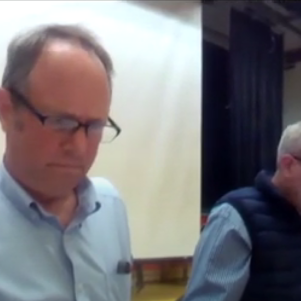GOP senator questions new Title IX policies
By Evan Lips | February 26, 2016, 15:44 EST
 U.S. Department of Education headquarters (courtesy — Wikipedia)
U.S. Department of Education headquarters (courtesy — Wikipedia) WASHINGTON, D.C. — A Republican senator from the Sooner State may have just kicked the proverbial federal hornet’s nest after questioning the legality of new Department of Education Title IX regulations and receiving an answer he claims shows that the new standards equate to “executive overreach.”
In early January, Oklahoma Sen. James Lankford penned a letter to the Department of Education’s Office for Civil Rights over the the Department’s October 2010 and April 2011 ‘Dear Colleague’ letters, memos that purport to interpret existing law related to sexual harassment and violence investigations, to various American universities and colleges that happen to receive some form of federal funding.
Lankford claimed in his Jan. 7 letter to Acting U.S. Department of Education Secretary John B. King that the new standards “fail to point to precise governing statutory or regulatory language that support their sweeping policy changes.”
The response Lankford received from the department on Feb. 17 “confirmed the suspicion for many academics, journalists and legal experts that these actions constitute executive overreach,” the Oklahoman declared in a statement issued Thursday.
Lankford specifically questioned the legality of the department’s 2011 mandate that colleges adopt a new “preponderance of the evidence” approach, or a lowering of the standards used to investigate and adjudicate allegations of campus sexual abuse. Lankford proceeded to ask why “notice-and-comment procedures,” or an opportunity for colleges and universities to comment in order to ensure “the best possible regulatory outcome” was ignored.
In her response to Lankford, Assistant Secretary for Civil Rights Catherine E. Lhamon defended the decision by arguing that the “notice-and-comment” window closed during the 1970s soon after Title IX regulations went into effect. The new “preponderance of the evidence” standard, Lhamon argued, merely represented a closer interpretation of the original agreed-upon statute.
“As you note, the Supreme Court unanimously confirmed in March 2015 that, under the Administrative Procedure Act, agencies may issue such guidance without notice-and-comment procedures because such guidance does not have the force and effect of law and is therefore expressly exempt from those requirements,” Lhamon added in her response to Lankford.
But according to a Jan. 7 Tulsa World report, the ‘force and effect of law’ threat plays a major role in the way colleges and universities deal with sexual violence allegations. An unnamed Lankford staffer told the newspaper that individual colleges and universities now face a “David versus Goliath proposition,” meaning if they fail to adopt the 2010-2011 policies outlined in the ‘Dean Colleague’ letters, punishment will be severe.
“The Department of Ed knows they are not going to get sued,” the Lankford staffer is quoted as saying, referring to the fear-factor at play for institutions of higher learning who may have contemplated challenging the legality of the letters . “Colleges and universities are so afraid of the Department of Ed, when we meet with them, they simply say, ‘Don’t use our names. We don’t want to alienate the department or risk losing our federal funding.’
“The Department of Education is one of the biggest abusers of this, period, and both the Left and the Right are essentially up in arms — if Harvard is afraid of the Department of Ed, you know there is a problem.”
It’s unclear what Lankford’s next move will be, but Lhamon has already testified before the Senate Health, Education, Labor and Pensions Committee in June 2014 and said that while her office has never withheld federal funding as punishment, it has used the threat to force schools to adopt the new standards.
“The threat of withholding federal funds is a very significant enforcement tool for us,” she said. “It has been used as an incentive for the institutions to be able to comply with the law.”
Effects of the new “preponderance of evidence” standard are beginning to surface in courtrooms across the country.
Earlier this month the former star quarterback for the University of Montana won $245,000 settlement from the school stemming from what his attorneys labeled as an “unfair and biased” rape investigation.
The student, Jordan Johnson, saw the accusation go public in March 2012, leading to his February 2013 criminal trial. Johnson however was acquitted the following month before filing his lawsuit.
Instead of pushing back against the Department of Education and the Office for Civil Rights through the courts system, universities continue to push back against accused students who have charged that the schools violated their right to due process.
Most recently, on Monday a federal judge in Rhode Island ruled against Brown University’s attempt to dismiss the lawsuit of a former student who alleges he was subjected to a wrongful sexual misconduct investigation.
In its motion to dismiss, Brown University pointed specifically to the ‘Dear Colleague’ letters issued to the school which the school’s attorneys argued “specifically mandates that a university may invoke interim measures as part of its Title IX response to sexual harassment allegations.”
In his ruling, Rhode Island District Court Judge William E. Smith referenced Brown University’s own code and policy which assures students accused of various offenses “the right to be assumed not responsible of any alleged violations unless he/she is so found through the appropriate student conduct hearing.”
“The question here is not whether Brown was following the OCR’s guidance; it is whether Brown’s actions violated the reasonable expectations of a student based on its Code,” wrote Smith. “The Court finds that, taking Doe’s allegations as true, Brown’s decision to ban him from campus prior to conducting an investigation states a plausible claim for a breach of the rights outlined in the Code to be assumed not responsible until proven otherwise.”
Read Smith’s full ruling here:
2015-April-John Doe vs Brown Judge OKs
NBPCampus











